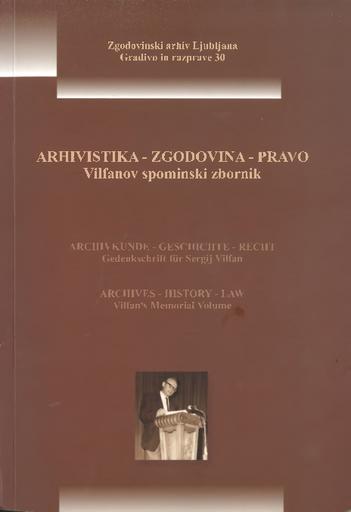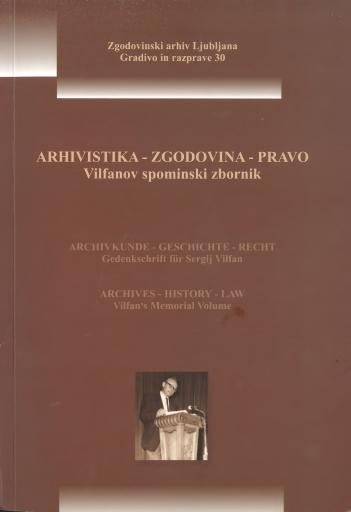/
Literatura
/
Monografije
Smeri razvoja sodobne arhivistike

Avtor(ji):Žarko Bizjak
Soavtor(ji):Nataša Budna Kodrič (ur.), Tatjana Šenk (ur.), Magda Lojk (lekt.), Doris Debenjak (prev.), mag. Niko Hudelja (prev.), Katarina Kambič (prev.), Martin Cregeen (prev.), Tatjana Rodošek (foto.)
Leto:2007
Založnik(i):Zgodovinski arhiv Ljubljana, Ljubljana
Jezik(i):slovenščina, angleščina
Vrst(e) gradiva:besedilo
Zbirk(e):Gradivo in razprave : 30
Avtorske pravice:

To delo avtorja Žarko Bizjak je ponujeno pod Creative Commons Priznanje avtorstva-Nekomercialno-Brez predelav 4.0 Mednarodna
Datoteke (1)

Ime:arhivistika_zgodovina_pravo1.pdf
Velikost:26.99MB
Format:application/pdf
Stalna povezava:https://hdl.handle.net/11686/file25390
Opis
Arhivistika se je iz pomožne zgodovinske vede zaradi družbenih sprememb,
tehničnega napredka, novih pravnih in organizacijskih zahtev ter kopičenja znanja
razvila v funkcionalno znanost, katere predmet raziskovanja je arhivsko gradivo.
To predstavlja — po definiciji Mednarodnega arhivskega sveta — spomin narodov
in družb, ki oblikuje njihovo identiteto in je temeljni kamen informacijske družbe.
Metapodatki (12)
- identifikatorhttps://hdl.handle.net/11686/41402
- naslov
- Smeri razvoja sodobne arhivistike
- Development Trends of Contemporary Archive Sciences
- ustvarjalec
- Žarko Bizjak
- soavtor
- Nataša Budna Kodrič (ur.)
- Tatjana Šenk (ur.)
- Magda Lojk (lekt.)
- Doris Debenjak (prev.)
- mag. Niko Hudelja (prev.)
- Katarina Kambič (prev.)
- Martin Cregeen (prev.)
- Tatjana Rodošek (foto.)
- opis
- The development of the Information society, new Information and communication technologies and globalisation háve also had an impact on archive science, its theory, methodology, Organisation and position in society. The basic functions of archive activities are evaluating documentary material, obtaining archive material for the archives in order to preserve it and communicate it to users. The basic principles of archive science, which were developed at the end of the 19th Century and introduced in Slovenia after the Second World War, also thanks to Academie Sergij Vilfan, remain unchanged. Archive science here and elsewhere in the world is confronted with three challenges, or tasks that it must resolve: - evaluating an exceptionally inereased quantity of documentary material: An archive Service must establish and maintain intellectual supervision of Contemporary organisations, the creators of archive material, which are characterised by organisational instability and the production of ever greater quantities of documentary material in their work. Because exchange functions are more numerous but more stable, modern archive science seeks new approaches or methodologies of mass evaluation of creators, their functions or documentary material. - Maintaining the legibility of various impermanent and machine readable material: In addition to material created in classical record forms, we háve been witness ' recent decades to ever new, more effective and attractive Systems of docum material. The new bearers of records or Information Systems are characterised by obsolescence. Archive science must therefore be devoted to Contemporary materij and be dosely linked with documentary and Information Sciences and thus meet th need for enabling the legibility or preservation of modem records in the future. - Setting up and maintaining effective and quality instruments for seeking archiv material: The amount of archive material is also increasing greatly in archives. Fast accessibility to specific sought material requires the construction and maintenance of quahty systém of search instruments which only modern Information and communication technology enables. All these challenges have linked the international archive community into a common Organisation and projects more than the founders of the International Council on Archives had hoped. The International Council on Archives collaborates dosely with a series of international organisations and conducts and Coordinates key development projects of professional training of archivists, handling digital material and standardisation of cataloguing archive material. If archive science was classified among subsidiary historical Sciences a decade ago, because of social and technological development and the needs of the Information society for preservation and accessibility of Information, archive science is today classified with library, documentary and Information Sciences among general humanist Sciences.
- založnik
- Zgodovinski arhiv Ljubljana
- zbirka
- Gradivo in razprave : 30
- datum
- 2007
- 01. 01. 2007
- tip
- besedilo
- jezik
- Slovenščina
- Angleščina
- jeDelOd
- pravice
- licenca: ccByNcNd
